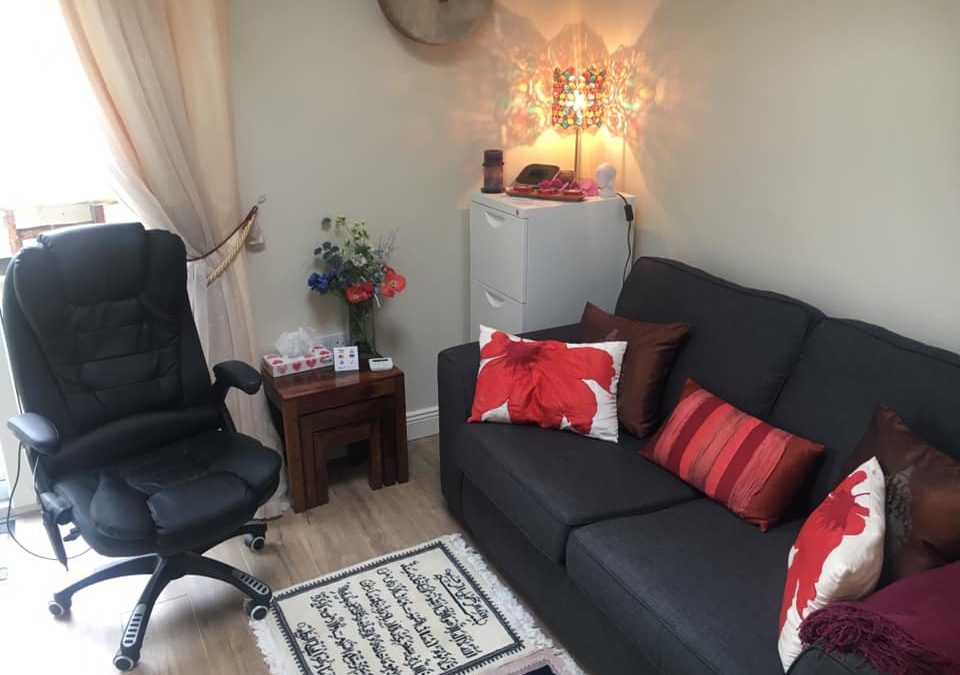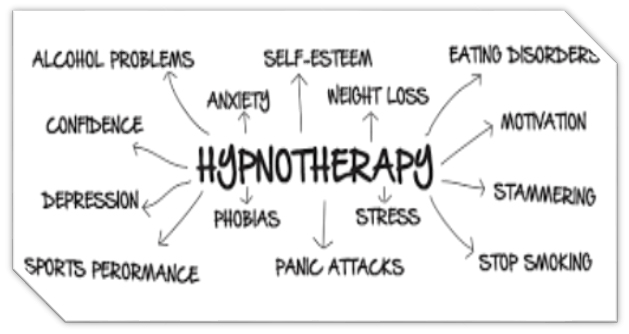Before the initial session of Hypnotherapy I conduct a general pre talk with you to explain what hypnosis is and how it works. You may ask any questions afterwards. This will give you a clear understanding of how your mind works and how it repaints to change using hypnotherapy.
Please read the following:
GENERAL PRETALK
Introduction
I’d like to spend a few moments with you before your session to talk a little bit about hypnosis and answer some questions that you might have. This will save us a lot of time when your session actually begins.
You have a pen and paper, please write down any questions you have so we can discuss them later.
The Mind Model
Now for you to understand how hypnosis works, it is important for you to know how your mind works.
First we have a conscious mind. This is where we are right now and most of the time. Below that level of awareness, we have the subconscious mind. And yet deeper still there is another part of us called the unconscious mind. Basically the unconscious mind does two things. First, it controls the strength or weakness of the immune system and, secondly, it controls the functions, the automatic body functions, such as; our heart beating, out breathing, and things of that order. During hypnosis we don’t use the unconscious mind.
Conscious Mind
The conscious mind is where we spend most of our time. It basically only does four things and no more.
Analytical Mind
The first thing it does, is analyses. This is the part of us that looks at problems, analyses them, figures out a way to solve those particular problems bothering us at the moment. It is also the part of us that makes hundreds of decisions we have to make on and average day, decisions that we think are automatic; but in fact, are not. Things like, “Should I open the door?”, “Should I turn the water on?” or “Should I tie my shoe laces?” Well, we think those are automatic functions, but we must make a decision as to whether or not we want to do those things.
Will Power
The second part of the conscious mind is called will power. Now, we all familiar with will power. We have all heard “I’m going to put down this pack of cigarettes and nothing on the earth will make me start smoking again!” We all know how long that generally lasts. When people go on a diet, how long does that generally last? Just until our will-power weakens and the old habit pattern comes back again.
Working Memory
The next part of the conscious mind is what called working memory. That’s the memory we need every day. This is short term memory
Critical Factor
The final part is the critical factor the blocking part of the conscious mind, this is the part which fools the mind into believing or justifying behaviours or thoughts. That’s all the conscious mind does. It is logical, very analytical and frequently wrong.
Sub-Conscious Mind
Now where the REAL you, me and everybody else lives is the level below the conscious mind which is called the sub-conscious mind. The sub-conscious mind is extremely powerful. It can make you into anything you want to be. Rich and famous, thin or overweight, happy or sad. To understand how the subconscious mind works, you need to understand that it very much like a computer and operates in a similar way too. You know that if you have a computer with no programs on it, it just sits there and doesn’t do anything. Now this computer can only operate based on the programming that is placed on it and it must operate on that programming, it has no choice. You know if you change the programming on the computer, it can no longer operate on the old programming and it must operate on the new programming information that has been loaded into it.
Well this is the way our sub-conscious mind works. It’s just like a computer. It functions on the same rules and regulations as an electronic one does; only it is more powerful. From the day we are born our computer is programmed every day through our life experiences. Every day we add programming to our internal computer. Now, the primary rule of our computer is this. It must, make us into the type of person that it perceives us to be based on all the programming that has been placed on it and will continue to be placed into it until the day we die.
Memory
So what is the operational software in out internal computers? First is all our memory, since the day we were born. The subconscious mind is like a video camera. Everything that has happened to you, everything that you have ever heard, seen, smelled or tasted is locked permanently into memory banks of your subconscious mind. We never forget anything. If there is a reason to, in hypnosis we can access that memory bank and it seems like we can actually travel back in time. For example, in regression hypnosis you can travel back and re-live your first birthday. Now, this is more that recall, it is actually like you are there, and it is happening all over again. You can see what happened, you can smell, you can taste, you can hear very clearly. We never forget anything in the subconscious, only at the conscious level.
Habits
The second programming we have in the inner mind, the subconscious mind, is habits. We automatically respond in a certain fashion when something else happens. When the phone rings, for example, we don’t look at it and wonder what it is, we automatically pick it up and depending on our mood; we answer it in a certain manner.
Emotional Mind
The next part of out subconscious mind is the emotional part. Of course, we wouldn’t want to be without emotions, love and caring and all those other good emotions, but sometimes our emotions get us into trouble. The conscious mind cannot deal with emotions in any way; that is not part of its job.
Protective Mind
The next thing in the subconscious mind, and probably the most important part of it is our protective mind. It must protect us against danger, real or imagined. You see, something imagined by the subconscious mind is just as is it were really happening, it can’t tell the difference. And it must protect us against danger.
Lazy Mind
The last property of the subconscious mind is a negative one. Although the subconscious is so powerful, it is also the laziest part of us. It doesn’t like to do the work that is required to accept positive suggestions to give change in areas where we would like to have change. It likes to keep things the way there are, it takes too much work to make change in a positive way. And positive suggestions are the most difficult things to get into our subconscious minds. On the other hand, negative suggestions go into this inner part of us like a hot knife through butter, because it doesn’t take any work to accept a negative suggestion.
Let me show you how this works. Take a very heavy person and they get out of the shower. They are standing in front of the mirror drying themselves. What do you think they are saying to themselves as they are looking into the mirror? “I’m Fat”. Now, this idea or taught or words go right into the subconscious mind and the subconscious mind says, “Yes, that matches the programming that I have in here, that matches the perception I have of you”. Therefore it accepts the suggestion so the perception of that person becomes stronger and they become heavier. On the other hand, if you take the same heavy person and stand them in front of a mirror and have them say, “I’m thin, I’m trim and I’m attractive”. That goes toward the subconscious mind and the subconscious mind says, “No, that does not match the programming”, “it would take too much work to change my programming”, and it’s not allowed in.
Hypnosis
Well, how do we get suggestion into that subconscious mind? Well, here we use something called hypnosis. Now, what hypnosis does is this. It allows us to by-passes the critical factor, the blocking part of our conscious mind.
You are not asleep
Now, when we are in the state of hypnosis, it is not what you expect it to be. Our bodies, if we are using a relaxation type of hypnosis, are very relaxed; but, the more we go into hypnosis, the more our conscious mind becomes alert. In the deeper levels of hypnosis, your conscious mind is two to three hundred percent more alert than you are at this very moment. All of your five senses, including hearing, smelling, tasting, and seeing are hundreds of times better than they are right now.
So when you are in hypnosis, you are not asleep, you are extremely alert, probably more alert and clear minded than you have ever been before. Now the important thing to understand about this is that the conscious mind takes on a different role when you are in hypnosis. I want you to think of it as playing the role of the guardian of the gates protecting you. When you receive a suggestion in hypnosis, you hear it loud and clear.
Four Mental Attitudes
Now when you hear that suggestion, and these are the tools of success or failure with Hypnosis. When you hear that suggestion with your conscious mind, you must, and you really don’t have and choice, make a decision about that suggestion. The decision you make determines whether that suggestion is allowed to enter your subconscious mind or whether it is rejected. If it is allowed to enter, you will have the change that you are here to achieve, if it is rejected, there will be no change.
What are these choices? The first one could be, when you hear the suggestion, you think or say to yourself, “I like this suggestion, I want it!”. This mental attitude at the conscious level allows that suggestion to go into the computer, your subconscious mind, and change begins.
Unfortunately, you have other choices. The next choice could be, well, actually hating the suggestion, or feeling that it is something against your morals or beliefs which would be rejected immediately, but perhaps that suggestion is just a tiny little bit uncomfortable for you. Well, if that suggestion sounds just the tiniest bit uncomfortable to you for any reason, it is automatically blocked by the critical factor of the conscious mind and it is not allowed to enter the computer and there is no change. The critical factor will not let anything into your subconscious that you do not like, even if it’s only a slight dislike of that suggestion.
The next choice could be that you are neutral about the suggestion, you don’t care if you get it or you don’t care if you don’t get it. It is a kind of meaningless suggestion to you. The conscious mind blocks this suggestion and it is not allowed to enter the computer.
The only time a suggestion is allowed to go into your computer is if you take the mental attitude when you hear the suggestion “I like that suggestion, I want it”. And that’s how easy it is.
The Truth
If you allow me to be your guide, I’ll show you how to place yourself in a beautiful state of hypnosis. Feeling the physical relaxation and mental alertness. If you allow me to be your guide, I’ll show you how to stay there until we are finished. If you ever don’t want to be in this beautiful relaxed state, the slightest taught by you and it’s over and you are back to your normal state of awareness. But if you follow my guidance, I’ll show you how to stay there.
And then the most important thing of all is, if you accept the suggestions given to you with the correct mental attitude, “I like it, I want it”, you’ll have change in the way you want it. If you take one of the other choices, the change you want will be much more difficult. I can’t force a suggestion into your main. Only you and allow it to happen.
Hypnosis is a 100% consent state by you. You must allow things to happen. You can stop them from happening with the slightest thought if you don’t want it to happen. I want you to know that anyone who wants Hypnosis, can go into a very deep level of Hypnosis, how fast? (Snap Fingers) Just like that!
The only thing that keeps a person from going into that beautiful state of physical relaxation and mental alertness is that they have a fear or misconception about what Hypnosis really is.
Fears and Misconceptions
I would like to talk to you briefly about some of the more common fears and misconceptions of Hypnosis.
Some people feel that when you are in Hypnosis, that you are asleep. Well, I want you to know that when your mind is 2 to 300% more alert that you are now at this very moment, this is about as far from sleep as you are ever going to get. Hypnosis has nothing to do with sleep.
Some people are afraid they won’t “wake up” from Hypnosis and they won’t. I agree with that, I have never seen anybody walk up from Hypnosis. There is only one thing that you can “wake up” form and that is sleep. If you are not asleep, you cannot wake up. Anytime you want to emerge from hypnosis, all you have to do is have the slightest thought that you don’t want to be in this relaxed state anymore and instantly, it’s over and you are back to your normal awareness.
There is another powerful misconception that some people have that says that I can control you and make you do anything I want you to do. I have to be honest with you, I wish that that was possible because then I could guarantee your success. But remember you have those four choices when you hear a suggestion and the only time the suggestion is allowed to enter your computer is if you say, “I like it, I want that suggestion”. I can’t force a suggestion in, I can’t control you. What mental attitude you take when you hear a suggestion determines success or failure.
Some people have the misconception that they will tell me all their deep dark secrets when they are in Hypnosis. For the same reasons of mental alertness, you are more in control of anything you choose to do or say while you are in Hypnosis than you are right now. If you don’t want to tell me something, then you simply won’t. If I was to ask you for information that was none of my business, you would simply tell me that it is none of my business. No one can make you divulge information that is proprietary.
Stage Hypnosis
Some people say, “That all sound reasonable but I’ve seen a stage Hypnotist work and I know he was controlling those people on stage. I’ve seen them run around like chickens and bark like dog’s” So Let me tell you how stage Hypnosis works.
When the stage Hypnotist comes out and gives a short lecture on Hypnosis saying he is showing the entertainment side of Hypnosis and there is also a clinical side, he tells the people, “Really good subjects are those individuals who have the best ability to imagine, a wonderful imagination and the ability to concentrate,” and he will give the audience a test for imagination and concentration, what he is actually doing is testing the audience for two very important things. First, who goes into Hypnosis quickly and more importantly, he is testing those people to find out who want to have fun and who is uninhibited in public. These are the people he invites up on stage. They usually enter Hypnosis very rapidly and very easily. And those people because they want to have fun, take the mental attitude, I like it, I want it to work and it does.
Many times on the stage, a person will think they want to do those things, but when it comes time to actually have it happen, they don’t have the correct mental attitude and the suggestion is ineffective. These people, the stage Hypnotist sends back to their seats, or, if it’s long enough into the show, he will sit them on a stage chair and ignore them for the rest of the show.
Stage Hypnosis operates by the same rules as clinical Hypnosis, you always have the choice as to whether or not you want that suggestion. If you don’t want it, truthfully don’t want it, it will be rejected and there will be no change.
Success Rate
So you see, Hypnosis is up to you. If you accept the suggestions with the correct mental attitude, I like it, I know it will work, yes, you will have 100% success.
Conclusion
I know you are going to enjoy our session together. Thank you for giving me this time with you.






 Hypnotherapy is used to successfully help people with weight management issues and takes around 6 sessions to change your whole thinking on why you struggle with weight management.
Hypnotherapy is used to successfully help people with weight management issues and takes around 6 sessions to change your whole thinking on why you struggle with weight management.


